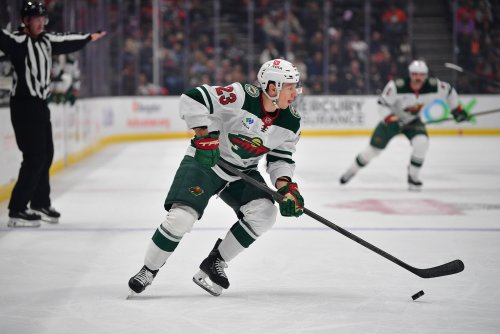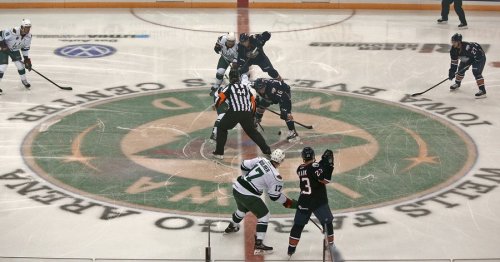
With free agency fast approaching, the likelihood of a coach being hired increases with each passing day. While we here at Hockey Wilderness are not overly concerned with who it is, and were not inclined to cover it much until the coach was actually hired, the people have spoken. We will talk to the people who know best the four coaches mentioned, the bloggers who covered them.
Enjoy in moderation, then let us know how you feel about Hitch being behind the bench. Thank you to Matt for taking the time and expending the energy necessary for such a post. Truly magnificent.
By Matt Wagner, The Cannon
Ken Hitchcock: Old Dog, New Tricks?
When John H. McConnell personally stepped in and hired Ken Hitchcock as the new coach of the Columbus Blue Jackets in November of 2006, the perception was that he was bringing in a man who knew how to make a winning team.
This was a very reasonable assumption. He's coached over 1,000 games at the NHL level. The man has a Stanley cup ring. He's one of the most successful coaches in WHL history. He's coached three consecutive NHL all star teams. It's a resume of exceptional talent and tremendous willpower, but somehow, despite leading the Blue Jackets to their first (and so far only) playoff appearance, it all came crashing down with terrifying speed, leaving him out of a job and back on the coaching market within three years.
Now that he's been targeted as a legitimate candidate for several jobs, including the Wild, it's worth looking at his tenure in Columbus, what he can still bring to the table, why things came undone, and what he may have learned from the entire process.
The Fundamentals
Offensively, Hitch's tenure in Columbus was a mixed bag.
Outside of guys who had enough talent to make offense happen regardless of the situation, there never seemed to be a consistent plan for creating scoring opportunities. Players were simply expected to wait for the opponent to make a mistake and try to get the puck to the net - and far too often scoring was accomplished almost by accident, and the it felt like an unusual occurrence for the defensemen to be actively involved in scoring chances.
Even in practices, Hitch focused heavily on zone play and defensive performance. Offense was something that either would happen naturally, or would be compensated for.
The Room
A final aspect that characterized the locker room under Ken Hitchcock was the general environment. From open practices to press conferences, there was a constant underlying tension - even when the team made the playoffs for the first time, it was run like a string beneath the mood of the franchise. Hockey, in Ken Hitchcock's world, is work - and he expects you to take it just as seriously as he does. You pay attention, you study the film, and you dedicate yourself.
That's not to say that players hated being in the room - or that he failed to develop players. While Hitch did sometimes prefer to work with "ambassadors" to his team - often his assistant coaches, or veterans like Michael Peca or Freddy Modin, particularly when trying to push issues, he's a student of the game, and enjoys being a teacher. He frequently brought in groups from the community to explain hockey 101, and happily would discuss points of the game in press conferences or on his radio show.
Neither is going to be regarded as a headline player, but each came into Columbus with a good bit of work effort, but perhaps not so much talent, and Hitch helped to refine each into a hardworking pro. Methot, especially, is one of the best defensemen in Columbus' d corps, and much of the credit for that goes to Hitch in teaching him how to refine his talent and approach the pro game.
Any player who is willing to put in the work will find Ken Hitchcock a willing and enthusiastic teacher - but you must demonstrate the willingness and the work ethic. He appreciates the players who go in, get their noses dirty, and aren't afraid to fight like hell. Developing skill players, however, is an area that stands out as a weakness - though he refined Rick Nash's skills, he didn't really develop them, and Brassard, for example, seemed to gain more from his time in Syracuse under Ross Yates in preparing for the NHL game than Ken Hitchcock.
The Downfall
A combination of these factors lead to Ken Hitchcock's eventual departure from Columbus - the "SRS BSNS" attitude, the difficulty in developing offensive players, and the conflicts between his treatment of younger players vs. veterans were a cocktail that could be mollified by winning, but stirred up into instability when losses mounted.
Into that mix, in 2009-10, came changes to a roster that, though it wasn't obvious at the time, represented a break between the team Hitch preferred, and the team Scott Howson was trying to create to meet the challenges of the increasingly fast and aggressive NHL.
The greatest loss in these changes was the loss of Michael Peca, who had frequently been a "buffer" between Hitch and the team at times of stress or difficulty in communication - a veteran voice who could both stand up to Hitch when needed, and to distribute the message as required.
With the shift in the room, there were some early successes, but also early failures, and the reactions were telling. When the team won a game 5-4, Hitch would look like a man who had bitten into a rancid lemon, displeased with the "loose" play even in a victory. If they got smacked 4-1, it was an effort problem, and his response was to crack down on the team in practice and game planning - particularly the younger players, who found their ice time decreased and their freedom with the puck restricted.
This set the stage for the next red flag, the handling of Nikita Filatov. A promising offensive talent, Filatov was notable for scoring a hat trick in only his third NHL game, and delivering a near point-per-game performance for the Syracuse Crunch in the same season. Called up for the team's playoff run, however, Filatov never saw the ice after mid-March, and witnessed the team's brief playoff run from the press box.
The following season, Filatov expected to find his way into a greater offensive role with the team, but after some early games where he had 8-10 minutes a night, his ice time was slashed again and again as Hitchcock attempted to "tighten up" the Jackets' play on the ice, sometimes seeing less than three minutes a game - if he wasn't scratched outright.
By November, Filatov had grown so frustrated that he would eventually request to return to Russia to play instead, the first major indication of the increasing friction in the room.
On the ice, that same concept of the "right" style was becoming an open book to opponents - particularly with the realization that sharp attacks into the zone or pure "speed" rushes could easily outmaneuver slower defenders like Commodore and Hejda. Unlike '08-09, Steve Mason was similarly becoming a known quantity, and with the defense unable to disrupt or disperse attackers, shooters were all too often able to pick their shots.
The Jackets were frequently in a position where they needed offensive track meets to keep themselves in games, and the incompatibilities of that need and the basic Hitchcock philosophy were simply too great to reconcile.
This incompatibility of system vs. players, and the unwillingness or inability to adapt to his GM's personnel moves, triggered the cascade that lead to Hitchcock's dismissal shortly before the Olympics, and the appointment of Claude Noel in his place.
Aftermath:
In the wake of his firing, Hitch took a year off, essentially. Aside from being one of the assistant coaches as part of Team Canada's gold medal run in Vancouver, he did not seek another job immediately. He did some scouting and development work for the Jackets, but by all reports he mostly spent last season getting back in touch with himself, working out, losing some weight, and fighting crime.
In May, Hitchcock was asked to take the reins for Team Canada at the World Championships, and offered one hell of an olive branch to his replacement, Scott Arniel, by bringing him on board as an assistant.
It's difficult to judge how Hitch would do in the NHL once again based on the performance of what is, essentially, an all star team, but for better or worse, it's what we have to judge him by.
It's clear the focus on defensive positioning and shot blocking is still there - in the 7 games Canada played, they only allowed 30 or more shots on goal twice. Hitch would rather see 500 pucks in the corners than one hit the goalie.
All in all, it seems like a case of "partial" adjustment, but there are still a lot of indications that Hitch would prefer a team that can lock down their opponents rather than driving the scoring themselves.
With that said, is it possible for Hitch to still be successful in the NHL, based on what we're seeing?
Oddly enough, I think the answer is yes, but it's going to take some very specific circumstances.
Think you could write a story like this? Hockey Wilderness wants you to develop your voice, find an audience, and we'll pay you to do it. Just fill out this form.









Recommended Comments
There are no comments to display.
Join the conversation
You can post now and register later. If you have an account, sign in now to post with your account.
Note: Your post will require moderator approval before it will be visible.